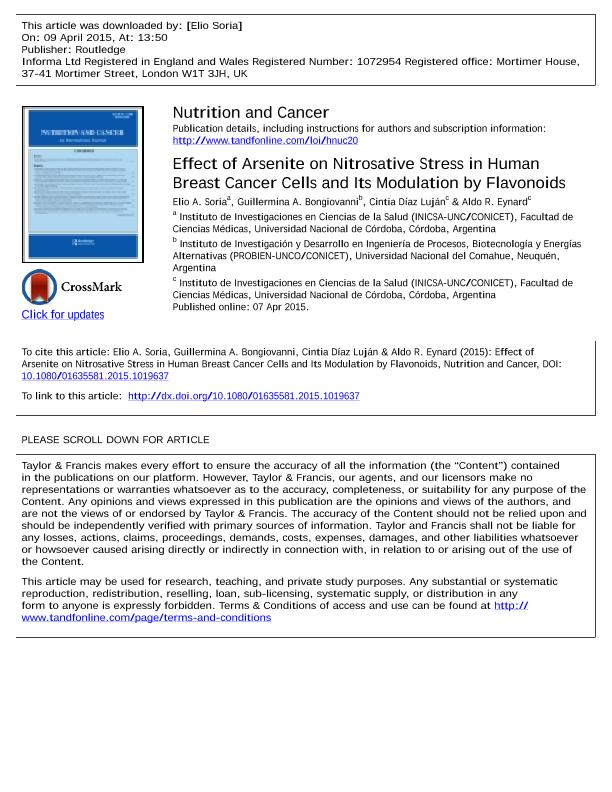Artículo
Effect of Arsenite on Nitrosative Stress in Human Breast Cancer Cells and Its Modulation by Flavonoids
Fecha de publicación:
04/2015
Editorial:
Taylor & Francis
Revista:
Nutrition And Cancer
ISSN:
0163-5581
e-ISSN:
1532-7914
Idioma:
Inglés
Tipo de recurso:
Artículo publicado
Clasificación temática:
Resumen
Arsenic (As) is used in the treatment of leukemia and breast cancer due to its oxidative cytotoxic action. However, it is also toxic to normal cells. One proposed anticancer mechanism induced by As might be nitrosative stress (NS). It is believed that antioxidant flavonoids in combination with As might reduce its toxic action on normal cells without interfering with its antitumor action. In the present study, we evaluated the antineoplastic potential of As on breast human cancer lines MCF-7 and ZR-75-1 treated with redox-modulating flavonoids, such as quercetin (Q) and silymarin (S). Even though both cell lines differed about their oxidative responsiveness, their viability was decreased by NS induction through γ-glutamyltranspeptidase inhibition. Arsenic triggered NS in both MCF-7 and ZR-75-1 cultures, with the formers more sensitive without recovering their pre-treatment capacity. ZR-75-1 cells maintained their antioxidant status, whereas MCF-7 ones treated with S, As, and As + Q did not. Silymarin did not interfere with the described As bioactivity. NS was an anticancer mechanism exerted by As depending on the redox cellular response that could be differentially modified by dietary antioxidants. Hence, it is worthwhile to consider the use of dietary antioxidants as adjuvant in cancer chemotherapy, especially when using As.
Palabras clave:
Adenocarcinoma
,
Chemotherapy
,
Nitrite
,
Quercetin
,
Silymarin
Archivos asociados
Licencia
Identificadores
Colecciones
Articulos(INICSA)
Articulos de INSTITUTO DE INVESTIGACIONES EN CIENCIAS DE LA SALUD
Articulos de INSTITUTO DE INVESTIGACIONES EN CIENCIAS DE LA SALUD
Articulos(PROBIEN)
Articulos de INST. DE INVESTIGACION Y DES. EN ING. DE PROCESOS, BIOTECNOLOGIA Y ENERGIAS ALTERNATIVAS
Articulos de INST. DE INVESTIGACION Y DES. EN ING. DE PROCESOS, BIOTECNOLOGIA Y ENERGIAS ALTERNATIVAS
Citación
Soria, Elio Andres; Bongiovanni, Guillermina Azucena; Díaz Luján, Cintia; Eynard, Aldo Renato; Effect of Arsenite on Nitrosative Stress in Human Breast Cancer Cells and Its Modulation by Flavonoids; Taylor & Francis; Nutrition And Cancer; 67; 4; 4-2015; 659-663
Compartir
Altmétricas




